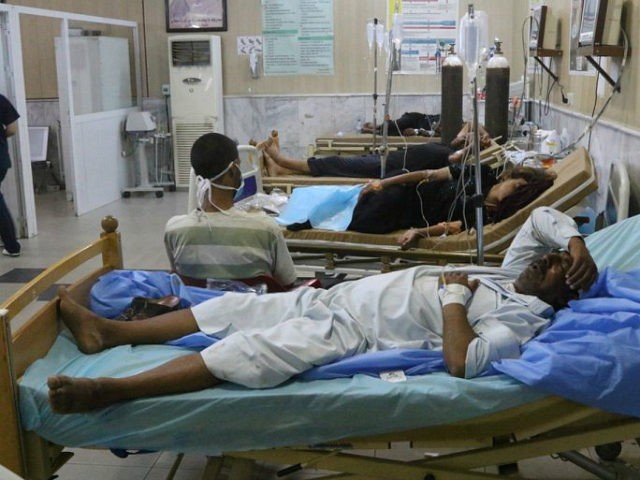The Kurdish outlet Rudaw reported on Tuesday that Baghdad had prevented Kurdistan Regional Government (KRG) hospitals from replenishing their medical supplies, endangering the lives of many patients in the region and the security of the many displaced by war who have flocked to Erbil for sanctuary.
“It has been four to five weeks since hospitals in the Kurdistan Region started suffering lack of medicines,” said Saman Barzinji, general manager of the Erbil Health Department, to Rudaw. “The reason is the mechanism of the sending of medicines from Baghdad to Erbil.”
“Baghdad has not sent any medicines since last month, discriminating against the provinces,” he added. “This lack of medicines is alarming and has to be solved before a catastrophe happens.”
The Rudaw report notes that Kurdistan has not yet run out of medicine because it has turned to requesting loans from private pharmaceutical companies to keep its hospitals running. The report indicates that the KRG has borrowed $100 million so far in medication.
Duhok Health Department official Dr. Nizar Ismat, who works under the KRG, told Rudaw that, even before the September referendum, Baghdad was paying for ten percent of the medical supplies used in Duhok province despite a dramatic increase in the need for medical care as a result of a refugee wave out of Islamic State-held territories like Mosul. Duhok served two million refugees in 2016, according to Rudaw.
The Iraqi military invaded the Kurdistan region in early October, following the execution of the region’s non-binding referendum on independence. Despite the fact that Erbil repeatedly stated the government would take no unilateral steps towards independence, a combination of Iraqi troops and Iran-backed, mostly-Shiite militias known as the Popular Mobilization Forces (PMF or Hashd al-Shaabi) invaded Kirkuk. While once outside of Kurdistan’s purview, the KRG’s Peshmerga had saved Kirkuk from an Islamic State invasion in 2014 after the Iraqi army fled, and the KRG had managed the city since.
PMF fighters have reportedly continued to expand their reach within Kurdistan despite Baghdad’s claims that they merely sought to redraw the borders to their pre-Islamic State status. The Kurdish outlet Bas News reported on Tuesday that Kurds within Kirkuk say the PMF “intend to alter the ethnic and religious characteristics of Kirkuk since they have seized control after militarily invading the province.” To that end, they have forced the Kurdish population of the city to flee and have begun the process of repopulating with Shiite Arab residents.
Bas News also cited locals who said the PMF had “launched random arrests and raid campaigns against Kurds and Sunni Arabs” in Kirkuk on Sunday.
Among the first things the Iraqi government did upon announcing the capture of Kirkuk was to forbid a Kurdish official from speaking Kurdish at a press conference. Baghdad later banned Rudaw, which first reported the incident in English, from Iraqi television. The PMF have displaced at least 100,000 people, most of them Kurds, in Kirkuk.
“If the United Nations, Iraq, and the U.S. do not gain control of the situation, the flames of sectarian conflict might lead to the risk of a Kurdish genocide in the Kurdistani disputed areas,” a statement from the Patriotic Union of Kurdistan (PUK), the KRG’s minority party, read in late October.
The NGO Kawa Aido has documented the displacement of Christian and Yazidi civilians from areas controlled by the PMF in Mosul as well. The Peshmerga played a pivotal role in defeating ISIS in Mosul, previously its regional “capital,” but the Iraqi government banned the Kurds from entering the city, opting to give the PMF that authority instead.
Iranian Quds Force leader Qasem Soleimani was spotted in mid-October aiding the Shiite fighters strategically, local reports stated, though the Iranian government insists it is not involved in the affair.
The Trump administration has chosen not to take a stand in defense of its Kurdish allies, among the most loyal pro-U.S. forces in the Middle East.
“Let me tell you, we’ve had for many years [a] very good relationship with the Kurds, as you know, and we’ve also been on the side of Iraq even though we should never have been there in the first place, but we’re not taking sides in that battle,” President Donald Trump said of the invasion of Kirkuk in October, days after claiming he would take a harder line against Iran’s growing imperialism in the region.
In response, KRG President Masoud Barzani announced this week that the KRG was currently undergoing a “serious revising” of its relationship with America. Barzani expressed particular dismay at the fact that the United States had not only failed to support Kurdistan but applauded and armed the PMF in the past.
“They were using the American weapons, Abrams tanks, and the others that the American government gave to the Iraqi army to use them in the fight against [the Islamic State]. But they used it against the people of Kurdistan, and the Americans stayed silent,” Barzani noted. “That was not expected.”

COMMENTS
Please let us know if you're having issues with commenting.